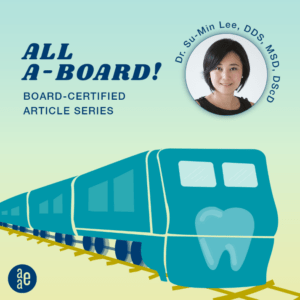‘All A-Board!’ Article Series: Dr. Su-Min Lee

Dr. Su-Min Lee, DDS, MSD, DScD is a practicing endodontist at Penn Dental Family Practice in Pennsylvania. She is a dedicated educator at the University of Pennsylvania, where she is an assistant professor of endodontics, an assistant director of the Postdoctoral Endodontics Program, and director of the Endodontic Clinic. Dr. Lee earned her DDS and MSD in South Korea at the Chosun University College of Dentistry before earning her DScD and DMD at the UPenn School of Dental Medicine.
Dr. Lee’s research has focused on the biology of the dental stem cells, regeneration of the dental pulp, dental tissue engineering, and biomaterials in Endodontics. She continues to serve as a reviewer for a variety of academic journals, including the Journal of Endodontics, the Journal of Dental Research, the Journal of the California Dental Association, and Restorative Dentistry and Endodontics
Read on to learn how Board certification enriched Dr. Su-Min Lee’s career as both an educator and an endodontic practitioner.
AAE: Why did you decide to get Board-certified?
Dr. Sumin Lee (SL): I decided to pursue Board certification as a full-time faculty member at the university for several reasons. Firstly, attaining Board certification represents a comprehensive recognition as an endodontist, signifying proficiency not only in broad endodontic knowledge but also in clinical skills and interpretation. Moreover, obtaining Board certification is a requirement to fulfill my qualifications as an educator. Beyond meeting the necessary criteria, I wanted to undergo the entire process to better understand and experience each step of Board certification preparation. This firsthand experience has equipped me with valuable insights into the preparation periods, enabling me to create realistic plans that I can share with my students. By going through the certification process myself, I am better equipped to guide and support my students effectively. I believe that my experience and understanding will not only help them in their preparation but also enable me to encourage and mentor them more effectively, fostering a supportive learning environment.
AAE: How long were you practicing endodontics before getting Board-certified?
SL: I practiced endodontics for approximately 9 years before achieving Board certification. I pursued a five-year Doctor of Science in Dentistry (DScD) program at the university of Pennsylvania School of Dental Medicine. After the initial two years of clinical residency, I transitioned to a research position at the lab, which temporarily diverted me from clinical practice. After a three-year hiatus, I returned to the clinic, where I diligently reviewed and assessed the cases I had completed during my residency. I actively followed up with my patients among the candidate cases for my board portfolio. Simultaneously, I prepared for the oral board exam and engaged in the performance of interesting and challenging clinical cases, all of which contributed to my comprehensive Board certification journey.
AAE: How long did you prepare for and complete the various parts of the exam, and what was this process like? How did you balance your career, personal life, and exam prep?
SL: Firstly, the written exam was a mandatory part of my residency requirements, and I dedicated approximately a month to its preparation. For the oral exam, I sought advice from Board-certified alumni and thoroughly studied all manuals and instructions provided on the ABE website. The oral exam preparation posed a significant challenge, mainly due to the need to find study time, which was nearly impossible on weekdays. Consequently, I had to block out my weekend schedule to focus on my studies. Fortunately, one of my friends also opted to take the oral exam during the same cycle as mine, providing mutual encouragement. I dedicated about three months to self-study and collaborated with my friend, who was also registered for the oral exam. We met every other weekend to simulate the oral exam setting, taking turns asking and answering questions for about two months.
To prepare the case portfolio, I initially reviewed completed cases from my residency. However, finding well-qualified cases was a challenge, leading me to perform more complex cases and conduct annual follow-ups. With the exception of surgery, I collected most cases, but for one patient who began orthodontic treatment after surgery, I had to wait for the completion of her treatment to obtain a comprehensive, long-term follow-up, which took approximately three years. Therefore, the preparation of the case portfolio proved to be the most time-consuming aspect of the process.
AAE: What has been the most profound benefit(s) of being Board-certified?
SL: The most profound benefit of being Board-certified has been the opportunity it afforded me to work as an educator in academia, as I mentioned in the previous question. The experiences gained through each step of the board exam preparation have allowed me to share valuable insights with my students. Offering real-world advice and guidance has proven to be a source of strong motivation for them. Moreover, the certification has had a positive impact on my professional visibility. Patients actively seek out Board-certified endodontists, and this recognition has led some individuals to find and choose me for their dental care needs. Ultimately, Board certification has not only enhanced my standing among colleagues but has also contributed to a heightened level of recognition and trust from patients.
AAE: What advice would you give to an endodontist who wants to get Board-certified, but is hesitant to make such a large commitment?
SL: I would advise them to consider the profound benefits that come with this achievement. The journey to becoming an endodontist is undoubtedly marked by strong commitment, and obtaining Board certification is a further testament to that dedication. Being a Board-certified endodontist elevates one to another level of achievement that is approved and recognized by esteemed board members. These individuals are highly regarded and experienced within our field. Consequently, receiving approval from these board members holds particular significance, surpassing recognition from the faculty of your own school. Attaining Board certification serves as a true step towards establishing oneself as an accomplished and respected professional within the field of endodontics.




